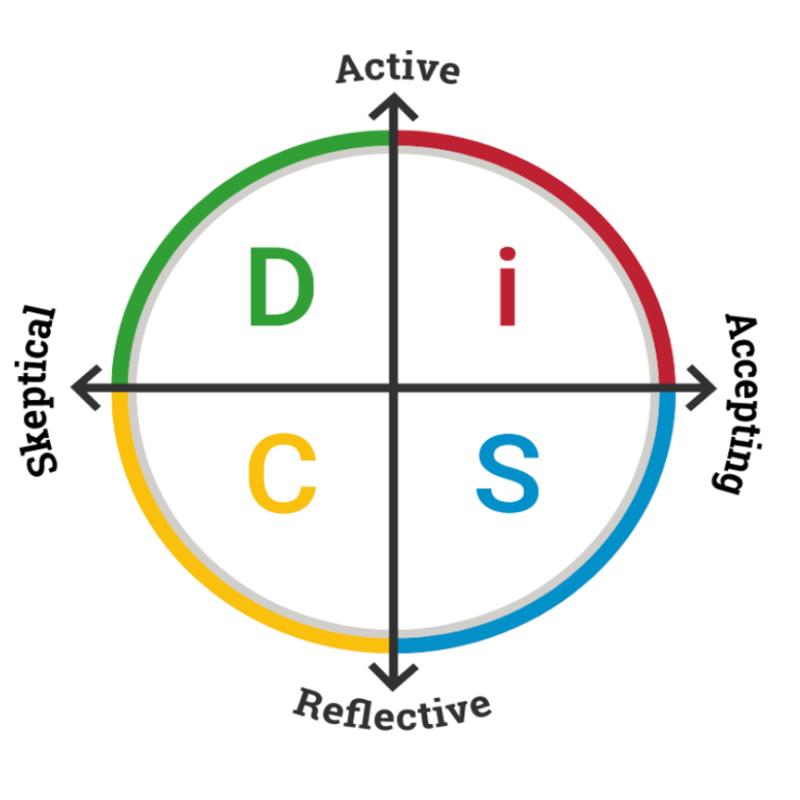DiSC S Personality – A Closer Look
The DiSC model of personality assessment has gained popularity in recent years for its ability to provide insights into communication styles, behavioural traits, and personal preferences. Among the four primary personality types, the S style, also known as the Steadiness style, is characterized by traits that make individuals reliable, patient, and good listeners.
In this blog, we will take a closer look at the S style personality, understanding its key traits, communication style, strengths, challenges, and how to effectively interact with individuals of this type.
Understanding the S Style Personality
The S style personality styles are known for their sincere appreciation of others, fostering stability in relationships. These individuals fear loss of stability, which can lead them to avoid conflict. S types are often team members who provide stability, consistency, and empathy, creating a supportive team environment.
Their steadiness, patience, and good listening skills make them reliable and trustworthy team members. Personal connections and close relationships are highly valued by S types, often prioritizing others’ needs.
Key Traits of the S Style Personality
S personality types possess traits that set them apart from others. They are dependable team players, known for their sincere appreciation of others, stability, consistency, and empathy. Their biggest fear revolves around loss of stability, which can cause them to avoid conflict. S types excel in roles that require good listenership, steadiness, patience, and personal connections.
The Role of Communication in an S Style Personality
Communication style plays a crucial role in the S style personality type. S types emphasize empathy, personal connections, and sincere appreciation in their communication. They prefer personal interactions, such as face-to-face conversations, to build relationships.
By excelling at listening, clarification, and empathy, S personalities create a supportive team environment. They value consistency and rapport, often communicating through emails or personal connections. Effective communication with S types involves providing reasoning, organization, and clarification.
The Strengths and Challenges of the S Style
The S style personality type brings numerous strengths to the table, but also faces specific challenges. Let’s explore both aspects.
Recognizing the Strengths of S Types
S types are known for their dependability, reliability, and team-oriented approach. They excel in roles that require stability, consistency, and empathy, such as customer service. Their attention to detail and desire for stability contribute to a consistent and efficient work environment. In high-stress situations, S types often act as a calming presence, making them valuable in crisis management or conflict resolution.

Overcoming the Challenges of S Types
Understanding the strengths and limitations of S types is essential in the workplace. These individuals may tend to avoid conflict and struggle with assertiveness. By prioritizing tasks, managing time effectively, and developing communication skills, S types can overcome these challenges. Collaboration with other personality types also helps in achieving team goals.
What Makes S Personality Types Unique
The S style possesses certain personality traits that set them apart from others, making them unique contributors to the team environment. Let’s delve into these traits in more detail.
Common Key Characteristics of S Personality Types
S types are characterized by traits such as steadiness, empathy, good listenership, and personal connections. They value stability, consistency, and sincere appreciation, both in personal and professional relationships. The communication style of S types is approachable, friendly, and businesslike, fostering good rapport within the team environment.

The Value S Types Bring to a Team
S types bring stability, consistency, empathy, and personal connections to team dynamics. They contribute to team communication by promoting clarity, clarification, and organization. Their traits of steadiness, empathy, and personal connections foster team cohesion, effectiveness, and a nurturing team environment.
Building Effective Relationships with S Types
Building effective relationships with S types requires an understanding of their needs, communication style, and traits. Let’s explore some tips and strategies for effectively working with individuals of the S style personality type.
Working with S Styles: Tips and Strategies
To effectively work with S styles, it is important to understand their needs for stability, consistency, and personal connections. Clear communication, clarification, and appreciation of their hard work contribute to a positive working relationship.
Creating a team environment that values stability, consistency, and personal connections is essential. Being empathetic, good listeners, and supportive of their needs is key to building effective relationships.
Managing S Styles
Managing S styles involves providing clear instructions, support, stability, and consistency. Understanding their need for stability, avoiding sudden changes whenever possible, and giving them time to process information and make decisions are important.
Fostering stability by maintaining a consistent team environment helps in managing S styles effectively. Developing good communication skills, especially in expressing needs, is essential for personal and professional growth.
Motivating S Styles
Motivating S styles involves highlighting the importance of their contributions, consistency, reliability, and stability in team success. Recognizing their team-oriented approach, good listenership, personal connections, and empathy boosts their motivation. Providing opportunities for personal and professional growth within a stable environment shows appreciation for their efforts. Helping them see the positive impact of their work on others further motivates S styles.
How Different DiSC Types Relate with S Types
Other DiSC styles relate to S types in various ways, benefiting from their stability, empathy, personal connections, and consistency. D types can benefit from S types’ attention to detail, while I types appreciate their good listenership and empathy. C types value S types’ consistency, clarification, and stability. Each type can learn from S types’ traits, and S types provide personal connections and rapport, fostering team relationships.
Related Article What DiSC Personalities Work Best Together?
Growth Opportunities for the S Style
The DiSC S style, like any other, has areas of personal development and specific career paths suited to their traits. Let’s explore the growth opportunities for individuals of the S style personality type.
Personal Development Areas for S Types
S styles can focus on personal development in areas such as assertiveness, adaptability, decision-making, communication, and leadership. By strengthening these skills, S types can overcome challenges, express their needs confidently, handle change, make effective decisions, communicate assertively, and take on leadership roles.
Career Paths Suited for S Types
S personality types tend to thrive in careers that value stability, consistency, personal connections, empathy, and good listenership. Administrative and office management roles, customer service and support, project management, healthcare, caregiving, and non-profit organizations are all career paths suited for S types. These roles allow them to utilize their traits effectively, contribute to team dynamics, and create a positive work environment.
S style in leadership
The S type personality brings stability, consistency, empathy, personal connections, and sincere appreciation to their leadership style. They prioritize team harmony, personal connections, and communication style that focuses on others’ needs. Their steadiness, empathy, and personal connections create a supportive and nurturing team environment. Leading by example, they demonstrate traits that foster team cohesion, stability, and effectiveness.
Are You a DiSC S Personality Type? Discovering Your DiSC Profile Personality Style
Discover your unique DiSC personality style by taking the DiSC assessment. Uncover the traits and behaviours associated with your DiSC style, and understand how they influence your communication and work style. Identify your strengths and growth areas as a S type to maximize your potential in the workplace.

Help Your Business Run Better
As your business evolves and grows, your people must also ebb and flow. Human transformation enables you to fine-tune leadership, develop talent, and become resilient. At Evolved Metrics we work with you and your team to make your business run cleaner, we build a customized program that improves workplace effectiveness across a variety of skill areas and generates continuous growth among your team.
Frequently Asked S Style Personality Questions
What is the ideal environment for the S personality type?
S personality types thrive in team environments that provide stability, consistency, personal connections, empathy, and sincere appreciation. They value communication that is clear, clarification, and organization, creating a sense of stability, rapport, and personal connections.
What does the high S personality style desire?
The high S personality style desires stability, predictability, personal connections, empathy, sincere appreciation, consistency, clarification, organization, rapport, and personal connections. These traits contribute to their sense of stability, harmony, and personal connections in personal and professional relationships.
What positive characteristics does the S type possess when in teams?
In team settings, S personality types bring steadiness, consistency, reliability, sincere appreciation, empathy, good listenership, personal connections, rapport, harmony, and personal connections. Their communication style is approachable, friendly, businesslike, and contributes to team cohesion and effectiveness.
What does the S personality style contribute to a team?
S personality types contribute stability, consistency, empathy, personal connections, sincere appreciation, good listenership, communication style, rapport, personal connections, team cohesion, effectiveness, and personal connections. Their traits foster team relationships, stability, and personal connections.


